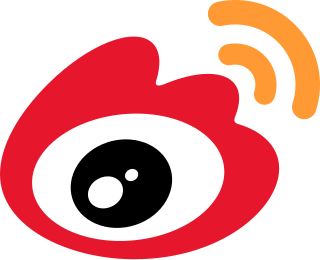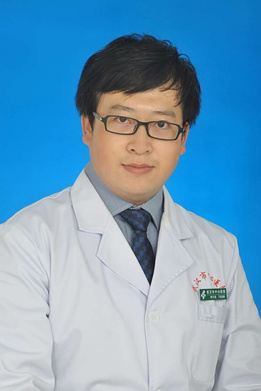
Caijing is an independent magazine based in Beijing that covers societal, political, and economic issues, with a focus on civil rights, public affairs, and business.

Hu Shuli is the founder and publisher of Caixin Media. She is also the professor of the School of Journalism and Communication at Sun Yat-sen University and the adjunct professor of the School of Journalism and Communication at Renmin University of China.

China Baowu Steel Group Corp., Ltd., commonly known as Baowu, is a state-owned iron and steel company headquartered in the Baosteel Tower in Pudong, Shanghai, China. The company was formed by Baosteel Group absorbing its smaller state-owned peer, Wuhan Iron and Steel Corporation in 2016. It is the world's largest steel producer.

Weibo, previously Sina Weibo, is a Chinese microblogging (weibo) website. Launched by Sina Corporation on 14 August 2009, it is one of the biggest social media platforms in China, with over 582 million monthly active users as of Q1 2022. The platform has been a huge financial success, with surging stocks, lucrative advertising sales and high revenue and total earnings per quarter. At the start of 2018, it surpassed the US$30 billion market valuation mark for the first time.

Fang Fang, pen name of Wang Fang, is a Chinese writer, known for her literary depictions of the working poor. She won the Lu Xun Literary Prize in 2010. Born in Nanjing, she attended Wuhan University in 1978 to study Chinese. In 1975, she began to write poetry and in 1982, her first novel was published. She has since written several novels, some of which have been honored by Chinese national-level literary prizes. Fang garnered international attention for her Wuhan Diary, documenting the early stages of the COVID-19 pandemic in China, and has used her platform to call for an end to internet censorship in China.
H World Group Limited, formerly Huazhu Hotels Group in English, is a hotel management company in China. In 2010, H World Group was listed on Nasdaq; in September 2020, H World Group achieved a secondary listing on the Main Board of the Hong Kong Stock Exchange. and in January 2023, H World was listed in the Hurun China 500 Most Valuable Private Companies 2022 and ranked No. 126. Its headquarters are in Jiading District, Shanghai.
Yang Xiaobo was a Chinese structural engineer, politician, and insurance executive. He served as President of the Central South Architectural Design Institute (2003–2007), Mayor of Huangshi, Hubei (2009–2014), and President of Changjiang Property Insurance Company (2014–2020), and was a delegate to the 12th National People's Congress (2013–2018). He died of severe pneumonia during the COVID-19 pandemic in Hubei.

Carol (Ying) Yu is the associate dean of Shenzhen InnoX Academy, former assistant chief editor, producer, and host of the weekly television interview show “Visionaries” on Phoenix TV. She was selected as a Young Global Leader by the World Economic Forum. She has also been chosen as one of the Ten Outstanding New Hong Kong Young Persons. Before joining Phoenix TV, Carol was with the Investment Banking Division of Morgan Stanley and the World Bank. Carol received her undergraduate degree in Economics from Stanford University and a Master’s in Public Policy from Harvard Kennedy School.
New Classics Media is a Chinese entertainment and media company established in 2007 that primarily invests in and produces Chinese television dramas and films. It has participated in and initiated many film and television productions. The company specializes in the production and distribution of Chinese historical costume dramas, offering services such as script discovery, costume design, prop sourcing, and publicity. It has been owned by publicly listed China Literature, the ebook business unit under Tencent, since 2018.

Huoshenshan Hospital was an emergency specialty field hospital, built between 23 January and 2 February 2020, in response to the COVID-19 pandemic in China. The facility is located near Zhiyin Lake (知音湖) in the Caidian District, Wuhan, Hubei, China, next to the Wuhan Workers' Sanatorium (武汉职工疗养院), and is designed to treat people with COVID-19. The hospital has run under the jurisdiction and management of the People's Liberation Army since its completion. A second field hospital, Leishenshan Hospital, using the same design, opened on 8 February, A further sixteen other temporary treatment facilities were set up in converted buildings in Wuhan for isolation and treatment of COVID-19 cases. Huoshenshan and Leishenshan hospitals were closed on 15 April after community transmission stopped in China, almost a month after the other temporary facilities had been closed.
Ma Guoqiang is a Chinese politician, engineer, and business executive. He had served as Deputy Communist Party Secretary of Hubei province and Communist Party Secretary of Wuhan, the capital of Hubei, from 2018 to 2020. Ma previously served as Chairman of Baowu Group, China's largest steelmaker. He is an alternate member and then a member of the 19th Central Committee of the Chinese Communist Party and was a delegate to the 8th National People's Congress.

Li Wenliang was a Chinese ophthalmologist who warned his colleagues about early COVID-19 infections in Wuhan.

Chen Qiushi, also known as Steven Chen, is a Chinese lawyer, activist, and citizen journalist who covered the 2019–20 Hong Kong protests and the COVID-19 pandemic which included criticism of the government response. He went missing on 6 February 2020 after reporting on the COVID-19 outbreak in Wuhan. The Chinese government reportedly informed Chen's family and friends that he had been detained for the purpose of COVID-19 quarantine. Critics, including media freedom groups, have expressed skepticism about government motives, and have unsuccessfully called on the government to allow outside contact with Chen.
The COVID-19 pandemic in Hubei was the first identified outbreak of COVID-19. It emerged as a cluster of mysterious pneumonia cases in Wuhan, the provincial capital of Hubei, China. A Wuhan hospital notified the local Center for Disease Control and Prevention (CDC) on December 27, 2019. By December 31, Wuhan CDC confirmed a cluster of unknown pneumonia cases linked to the Huanan Seafood Wholesale Market after unverified documents appeared on the Internet. The outbreak soon drew nationwide attention, with the National Health Commission (NHC) in Beijing sending medical experts to Wuhan the next day. On January 8, 2020, a new coronavirus was identified as the cause of the pneumonia. The sequence of the virus was soon published on an open-access database. Measures taken by China have been controversial. They were praised by the World Health Organization (WHO) for improvements over their response to SARS-CoV-2, but maligned by many in the international community for being deceptive or slow to publicly disclose key facts about the outbreak and for aggressively censoring information related to the outbreak and public discontent from citizens online.
Xie Linka is a Chinese physician who gave early warning about the spread of COVID-19 in Wuhan, China. She became known for being a whistleblower, a title given to others in China who had warned the public, such as Liu Wen, and Dr. Li Wenliang, who was infected and later died from the virus.
Zhang Jixian is a Chinese pulmonologist. She is known to have discovered SARS‑CoV‑2, and was the director of the Department of Respiratory Medicine of Hubei Provincial Hospital of Integrated Chinese & Western Medicine. She is also a member of the Chinese Communist Party.

This article documents the chronology and epidemiology of SARS-CoV-2 in 2019, the virus that causes coronavirus disease 2019 (COVID-19) and is responsible for the COVID-19 pandemic. The first human cases of COVID-19 known to have been identified were in Wuhan, Hubei, China, in December 2019. It marked the beginning of the 2019–2020 COVID-19 outbreak in mainland China.
Liu Lian'ge is a Chinese banker currently under an anti-corruption investigation of the National Supervisory Commission of China. He previously served as board chairperson and Chinese Communist Party Committee Secretary of the Bank of China from 2019 to 2023, and as president and board vice chairperson of the Bank of China from 2018 to 2019.
The China Reform Holdings Corporation, is a Chinese state-owned investment holding company. The company's purpose is to make investments in industries related to the national security and economy of China.
Wuhan Hongxin Semiconductor Manufacturing Co. Ltd. (Chinese 弘芯), a multi-billion chip project backed by the Wuhan government, China, folded in March 2021 when it dismissed all its employees, three years after it opened in 2017. It was viewed as the latest setback to China's semiconductor industry at the time.











